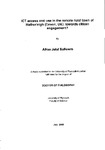ICT access and use in the remote rural town of Hatherleigh (Devon, UK): towards citizen engagement?
| dc.contributor.author | Sallowm, Afraa Jalal | |
| dc.contributor.other | Faculty of Science and Engineering | en_US |
| dc.date.accessioned | 2013-09-13T08:52:07Z | |
| dc.date.available | 2013-09-13T08:52:07Z | |
| dc.date.issued | 2009 | |
| dc.identifier | NOT AVAILABLE | en_US |
| dc.identifier.uri | http://hdl.handle.net/10026.1/1674 | |
| dc.description.abstract |
Information communication technologies (ICTs) have reached into everyday life. This emphasises the increasing importance of understanding the relationship between ICTs and society (Giddens 1994; Castells 1996; Walsham 2001). Over the last few decades, ICTs have shaped many aspects of society, and the specific role that ICTs have played in influencing government and governance structures has received particular attention. Today, the term 'governance' is widely used and accepted amongst a variety of academics and practitioners. However, in recent years the processes by which rural areas are governed have changed remarkably. Many scholars accept the conceptual and theoretical debate concerning the actual and potential impact of ICTs as a powerful force shaping governance (Goodwin 1998; MacKinnon 2002), but few have attempted to support their argument by conducting detailed empirical analyses of the role and influence of ICTs for egovernance processes in rural communities. This thesis addresses this gap by analysing the linkages between ICT access and use in a remote rural area of the UK. The thesis presents an in-depth case study analysis of a rural market town (Hatherleigh) located in west Devon. It examines ICT access and use in Hatherleigh considering that individual levels of ICT adoption are uneven, depending on factors such as age, gender, employment and family composition (Ofcom 2006; Selg and Svensoon 2008). It follows a wider call in the area of rural and ICT studies that many remote rural areas face serious challenges in their efforts to benefit from the opportunities offered by ICTs (Woods 2005; Moseley and Owen 2008). The thesis particularly builds on Okot-Uma's (2001), Millard's (2003) and Odendaal's (2003) work on the impact of ICT on governance and potential changes in service delivery to rural areas. To understand the impact of ICTs on e-governance in rural areas more fully, specific emphasis is placed on how Hatherieigh residents use the internet for accessing on-line information and services and how they use the internet to engage with policy stakeholders within and beyond Hatherleigh. A specific focus is placed on analysing barriers affecting e-governance processes ranging from the local to the national scale. Ill The methodology used to collect empirical data is based on a multi-method approach, including questionnaires, interviews and participant observation to explore interactions between Hatherteigh residents and ICTs. The results suggest that ICT has changed the social landscape of rural communities such as Hatherleigh in terms of communication and job opportunities, and that it plays a key role in reducing feelings of distance and isolation. A key result is that the internet plays an important role for e-governance interactions at the regional/national level, but that it only plays a minor role at the local level. A key explanation for these different 'geographies of ICT use' is that remote mral locations such as Hatherleigh are (still) characterized by relatively close-knit communities where physical face-to-face interaction still plays an important role, thereby reducing the need for internet use to access local information. The study also suggests a typology of non-users in Hatherleigh, suggesting that non-users are a highly differentiated group in which some segments are relatively keen to use ICT in the future, while others continue to staunchly resist using ICTs. The latter are a particularly problematic group as they may be 'doubly' excluded by both living in a remote mral area that has lost some of its services (to some extent because of ICT availability) and by not being interested in using ICTs to overcome such disadvantages. | en_US |
| dc.language.iso | en | en_US |
| dc.publisher | University of Plymouth | en_US |
| dc.title | ICT access and use in the remote rural town of Hatherleigh (Devon, UK): towards citizen engagement? | en_US |
| dc.type | Thesis | |
| plymouth.version | Full version | en_US |
| dc.identifier.doi | http://dx.doi.org/10.24382/3368 |
Files in this item
This item appears in the following Collection(s)
-
01 Research Theses Main Collection
Research Theses Main


